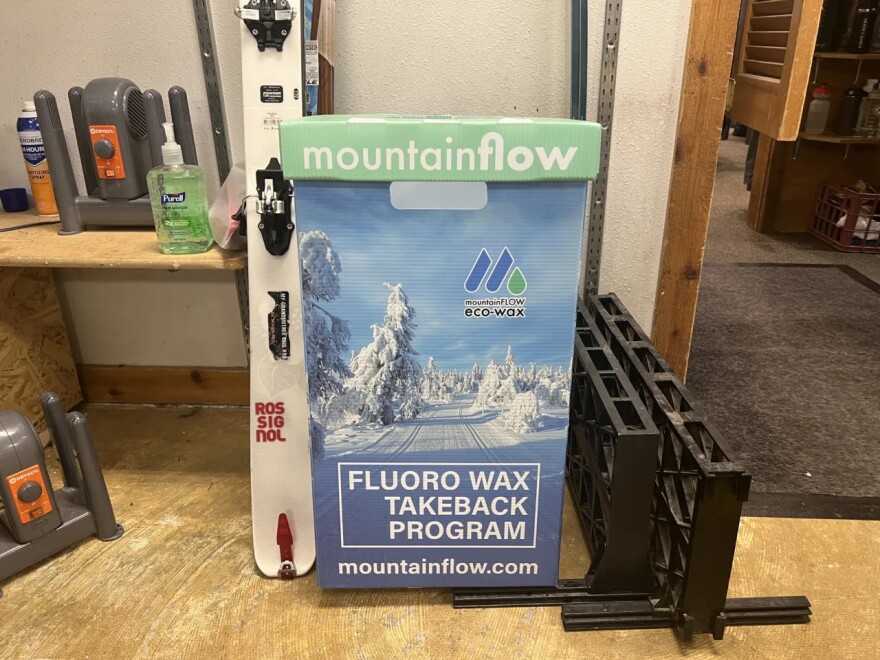“There are all different kinds of flavors of ski wax for just about every temperature or snow condition that you can imagine,” Skinny Skis co-owner Scott O’Brien said, sitting in the back room of his shop, which specializes in Nordic skiing, outdoor gear and apparel.
O’Brien has been cross-country skiing almost his entire life. He said he saw waxes introduced in the ‘90s that had per- and polyfluoroalkyl substances, known as PFAS, in the 1990s.
“It was a real game changer because of their water repellency,” O’Brien said. “It was a game changer when it came to performance.”
But the chemicals may put the community’s health at risk.
PFAS in everyday products
According to the Food and Drug Administration, PFAS are chemicals that resist oils, water, and heat. They first started being used in the 1940s and are now in thousands of chemicals used in hundreds of types of products — like nonstick cookware, cleaning products, even dental floss, nail polish, and eye makeup.
PFAS are called “forever chemicals” because they never go away. They can enter the air, water, and soil supply, and have been linked to serious health problems like kidney and testicular cancer, pregnancy-induced hypertension and preeclampsia, decreases in birth weight, and increases in cholesterol levels.
In 2022, the U.S. Environmental Protection Agency (EPA) issued an advisory that violations of the Toxic Substances Control Act may put skiers and wax applicators at risk for exposure and told stores not to sell certain PFAS products.
But O’Brien said skiers may still be using older waxes that have PFAS and not know it.
So, Skinny Skis is offering an opportunity for locals and visitors to see if their wax has PFAS and, if so, deposit it for safe disposal while getting a small discount on some new wax.
“We are offering a buyback program, where you drop off your fluorowax, and we’ll provide a 20 percent discount up to $100 for the purchase of some of these newer waxes that are just healthier and more environmentally friendly,” said Scott O’Brien, co-owner of Skinny Skis.
O’Brien said new ski waxes without PFAS may be a little cheaper too, but the jury is still out on whether newer waxes may be any healthier in the long run.
“They’re better for us health-wise, better for the environment. But even there, I should throw in some caution.” O’Brien said. “That’s how we view them right now. Ten years from now, we might realize, ‘Oh, we could clean this up even better.’”

Local impact of PFAS
This may be the first year a store in Jackson has begun taking ski wax with PFAS, said Tanya Anderson, the ecosystem stewardship administrator for the town of Jackson. But this could be the beginning of more efforts to try and eliminate PFAS in the environment.
“A little over a year ago, I read a report that was showing high counts of PFAs in freshwater fish,” Anderson said. “Our community was not studied, but there were some other communities that were remote, that were not that far from here, that had high levels, high concentrations of PFAS in freshwater fish that can infect anyone who is dependent on fish as a food source.”
Tanya said mostly larger communities that have some sort of industry-creating PFAS have been studied. How much PFAS is in the local environment is unclear, but it is impacting some other areas in the Mountain West.
Last year, the Jackson Hole Airport transitioned to fluorine-free firefighting foam after PFAS concentrations were found nearby.
“There is a plume that is detectable that has some PFAS in it affecting some of the households that are very close to the airport,” Anderson said. “At this point, we haven’t seen it go further, but we also are not required to test for it at this point by the EPA.”
Teton County Integrated Solid Waste and Recycling has a hazardous waste collection facility that accepts PFAS-containing materials, but it is only open for half the year, from April to October. Residents have to make an appointment and may need to pay a fee.
For people wanting to rid themselves of PFAS ski wax this winter, Skinny Skis may be the easiest and cheapest bet to dispose of them.
“Just drop it off,” O’Brien said. “We will have it sent away for proper disposal.”
There are already a handful of cans of ski wax in O’Brien’s collection box. He said he expects the collection to grow once more people learn about PFAS in their wax.
And for residents worried that new ski waxes without PFAS may not perform as well, O’Brien said, rolling with environmentally healthier changes is all part of enjoying the outdoors in Jackson.
“You’re doing it to be outside, to engage with nature. How you get there should be less important,” O’Brien said. ”Particularly when it comes to these wax products – Yeah, it’s a different expectation of how they’re going to perform. But the experience itself shouldn’t necessarily have to change.”
The EPA has been highlighting the issue of PFAS in ski wax.
Some ski resorts have banned certain brands of wax due to the presence of PFAS. Last year the Park City ski resort in Utah implemented such a ban after forever chemicals were found in the city's drinking water.
This story was shared with KSUT via Rocky Mountain Community Radio, a network of public media stations in Colorado, Wyoming, Utah, and New Mexico, including KSUT.
Copyright 2024 KHOL.






